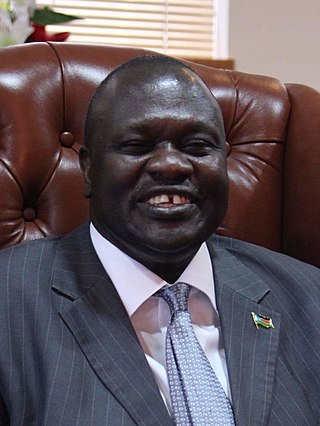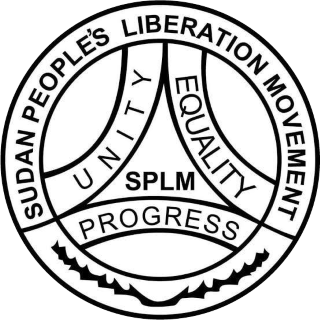
Riek Machar Teny Dhurgon is a South Sudanese politician who served as the First Vice President of South Sudan.

The Sudan People's Liberation Movement is a political party in South Sudan. It was initially founded as the political wing of the Sudan People's Liberation Army in 1983. On January 9, 2005 the SPLA, the SPLM and the Government of Sudan signed the Comprehensive Peace Agreement, ending the civil war. SPLM then obtained representation in the Government of Sudan, and was the main constituent of the Government of the then semi-autonomous Southern Sudan. When South Sudan became a sovereign state on 9 July 2011, SPLM became the ruling party of the new republic. SPLM branches in Sudan separated themselves from SPLM, forming the Sudan People's Liberation Movement–North. Further factionalism appeared as a result of the 2013–2014 South Sudanese Civil War, with President Salva Kiir leading the SPLM-Juba and former Vice President Riek Machar leading the Sudan People's Liberation Movement-in-Opposition.
Daga Post is a city in northeastern South Sudan on the Daga River, near the border with Ethiopia. It lies on the same longitude as Addis Ababa, the Ethiopian capital.

Bentiu, also spelled Bantiu, is a city in South Sudan and capital of the state of Unity State.

The politics of South Sudan concern the system of government in the Republic of South Sudan, a country in East Africa, and the people, organizations, and events involved in it.

Donald E. Booth is an American diplomat who is serving as the U.S. Special Envoy for Sudan. Between August 2013 and January 2017, he was the U.S. Special Envoy to Sudan and South Sudan. Prior to his appointments as special envoy, Mr. Booth served as the Ambassador of the United States to Liberia, Zambia, and Ethiopia.
The Yabus River rises in the far west of Ethiopia, in Asosa Zone, flows west into Sudan past the town of Yabus, then enters South Sudan. At the town of Bunj it turns south west and enters the Machar Marshes, where it loses its identity.
Ramciel is a location in South Sudan that will serve as the site of the future national capital. John Garang, the third president of Southern Sudan, allegedly wanted to place the national capital in Ramciel during his administration, but he died before South Sudan achieved independence and its largest city of Juba became the capital instead.

South Sudan, officially the Republic of South Sudan, is a landlocked country in eastern Central Africa. It is bordered by Ethiopia, Sudan, the Central African Republic, the Democratic Republic of the Congo, Uganda, and Kenya, and includes the vast swamp region of the Sudd, formed by the White Nile and known locally as the Bahr al Jabal, meaning "Mountain Sea". The population was 11,088,796 in 2023, and Juba is the capital and largest city. South Sudan gained independence from Sudan on 9 July 2011, making it the most recent sovereign state or country with widespread recognition as of 2024.
The history of South Sudan comprises the history of the territory of present-day South Sudan and the peoples inhabiting the region.
The Machar Marshes are a large area of wetlands in the state of Upper Nile, South Sudan. Estimates of their size vary. A 1950 study put the area of swamp at 6,500 km2. A 1980 study put the area of permanent swamp at 8,700 km2, 60% of which was grass and forest.
The Adar River, known to the Dinka as the Yal, is a tributary of the White Nile in the state of Upper Nile, South Sudan. It flows north west from the Machar Marshes and enters the White Nile just upstream of the town of Melut.
Paulino Matip Nhial, or Matiep Nhial, was a military leader and politician in South Sudan.
Gordon Kong Chuol is a former militia commander in South Sudan, who fought for the Sudan People's Liberation Army (SPLA) and later for the forces led by Riek Machar during the Second Sudanese Civil War.

The Adar oilfield, also known as the Adar Yale, Adar Yeil or Adaril field, is an oilfield situated in the Melut in South Sudan estimated to contain about 276 million barrels (43,900,000 m3) of oil. The Chevron Corporation discovered the Adar Yale field in 1981, shortly before the start of the Second Sudanese Civil War (1983–2005). Soon after Chevron had suspended operations in 1984, Sudanese government troops began attacking civilian settlements in the area, burning the houses and driving the people away, and in the late 1990s, Nuer militias from Nasir helped the army in clearing away the people to make way for the roads and infrastructure of the oilfield.

The South Sudanese Civil War was a multi-sided civil war in South Sudan between forces of the government and opposition forces. In December 2013, President Salva Kiir accused his former deputy Riek Machar and 10 others of attempting a coup d'état. Machar denied trying to start a coup and fled to lead the Sudan People's Liberation Movement-in-Opposition (SPLM-IO). Fighting broke out between the Sudan People's Liberation Movement (SPLM) and SPLM-IO, igniting the civil war. Ugandan troops were deployed to fight alongside the South Sudanese government. The United Nations has peacekeepers in the country as part of the United Nations Mission in South Sudan (UNMISS).

The Sudan People's Liberation Movement-in-Opposition, also known as the anti-governmental forces (AGF), is a mainly South Sudanese political party and rebel group that split from the Sudan People's Liberation Movement in 2013, due to political tensions between President Salva Kiir and Vice President Riek Machar over leadership of the SPLM. Tensions grew between forces loyal to Kiir and Machar and South Sudan plunged into the South Sudanese Civil War.

The Pagak offensive was a major military operation by the South Sudanese government during the South Sudanese Civil War with the aim of capturing the strategic town of Pagak and the wider Maiwut County from Riek Machar's SPLM-IO rebels. Since the civil war's beginning, Pagak had served as headquarters and stronghold for the rebels, and its loss was believed to possibly greatly weaken the insurgency. A large part of the government forces that took part in the offensive are members of the SPLM-IO, a break-away group from Machar's movement that is loyal to First Vice President Taban Deng Gai. Though pro-government forces managed to capture Pagak on 6 August, their attempts to secure the surrounding areas proved unsuccessful. As result, the SPLA-held corridor between Mathiang and Pagak remained unsafe.

The Ethiopian Unity Patriots Front is a political party and militant rebel organization that waged an insurgency against the Ethiopian government from 1993 to 2012. Formed by ex-officials of the Derg regime, the EUPF was mostly active in Ethiopia's Gambela Region as well as eastern Sudan and South Sudan. The group agreed to a ceasefire with the Ethiopian government in 2012, and officially ended its insurgency in 2016. The EUPF remains active, however, and its armed wing has reportedly been involved in the South Sudanese Civil War, although to what extent is disputed.











